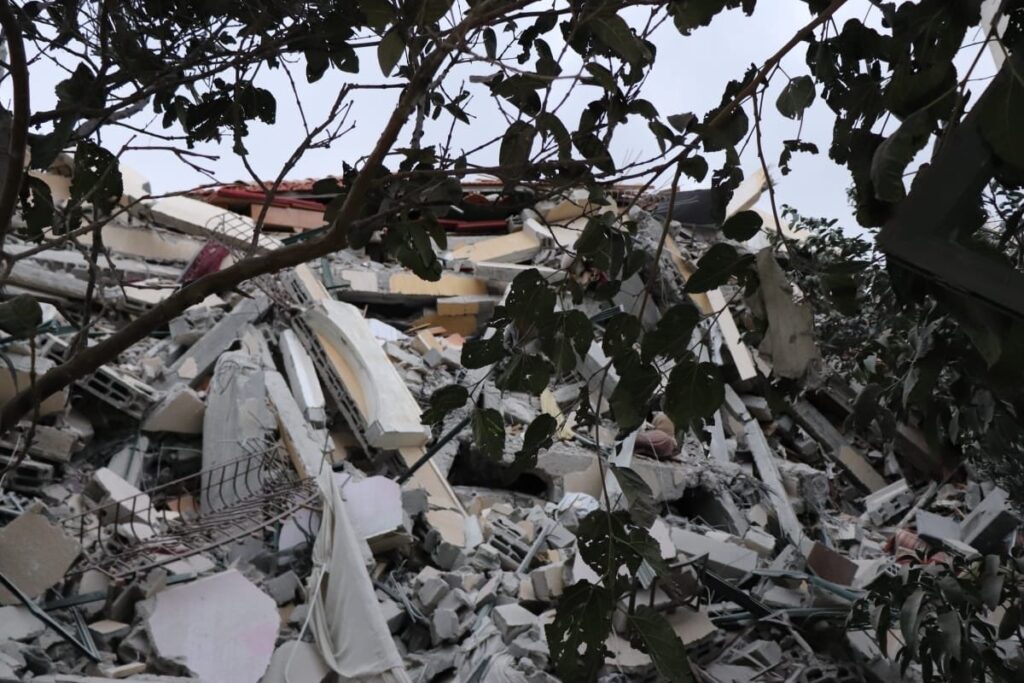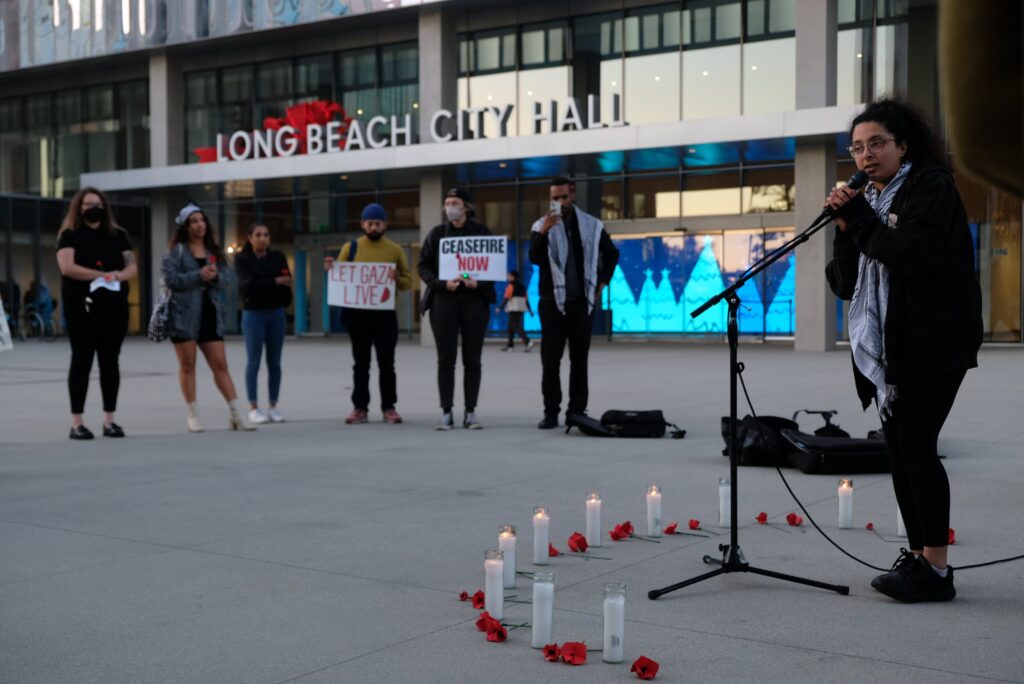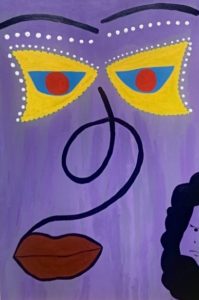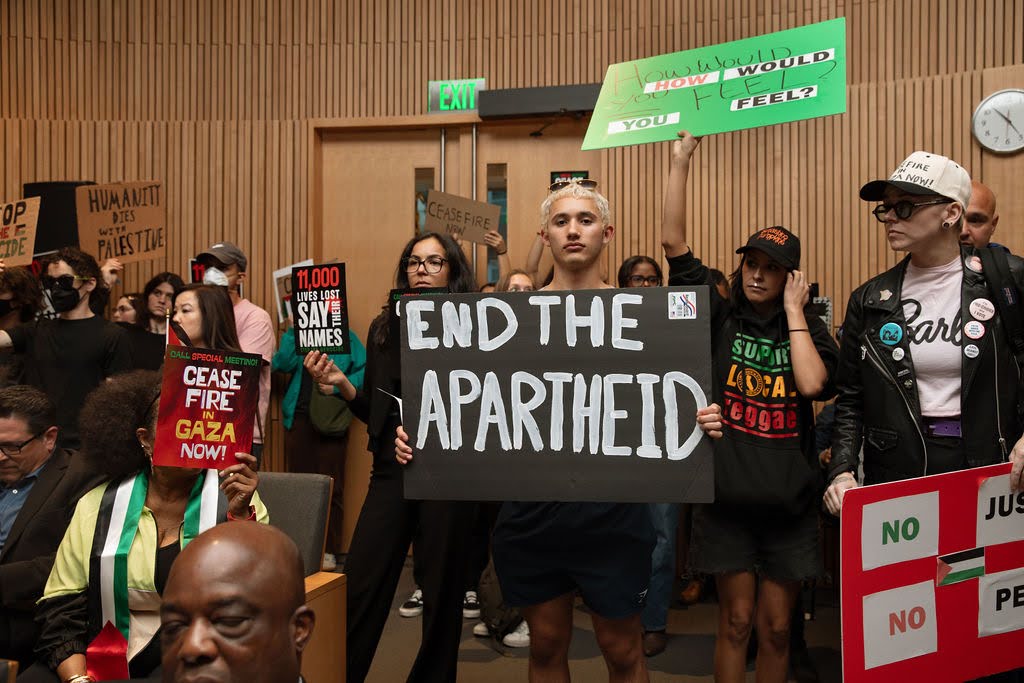Local Palestinians Say a Lasting Ceasefire in Gaza and Israel is a Long Beach Issue
15 minute readThe City Council passed a proclamation calling for a “lasting humanitarian ceasefire” in Gaza and Israel by a vote of 5-2. Councilmembers Kristina Duggan and Daryl Supernaw voted against the motion. Long Beach became the largest city in the state to support a ceasefire.
Demonstrations by both pro-Palestine and pro-Israel groups will be taking place outside City Hall at 4 p.m. this afternoon prior to the City Council meeting at 5 p.m.
“We’re under the assumption that they’re probably dead.”
That’s the grim conclusion Samar Marwan has been forced to make about her aunt and cousins, whose home in the Al Karama neighborhood in north Gaza was bombed to rubble by Israeli forces on Oct. 12.
“It’s basically impossible for us to find out due to the lack of communication,” she said. Cell phone and internet service in Gaza has gone dark for days during Israel’s scorched-earth leveling of the occupied territory.
Marwan, a local first-generation Palestinian, says her family in Gaza survived the bombing and fled to a U.N. school that was being used as a makeshift shelter. That’s when the WhatsApp messages and phone calls stopped.
“The most painful part is thinking about how they might have died. Was it an airstrike, sniper? Were they bulldozed or starved to death? Or did they die alone crushed by the rubble of a building, bleeding, suffocating through the dust,” said Marwan. “It’s been the most unbearable feeling—to not know if your loved ones are alive or dead. Knowing they won’t be able to be buried in a dignified way.”
For Shirin Senegal, a local Palestinian refugee, checking in with family in Gaza has been a daily reminder of the death, destruction, and deprivation visited upon her people—a reality made more dystopian knowing that the violence is being partly funded by her own tax dollars.
“My grandfather’s home that’s been in our family for generations, that he’s passed on [to us], is now crumbled. Like, this is with U.S. taxpayer money, with my money as well, as a Palestinian woman,” she said.
The U.S. sends $3.8 billion a year to Israel for military and missile defense systems. An estimated $6.2 million of that sum comes from Long Beach residents, according to the U.S. Campaign for Palestinian Rights. And more funding could be on the way soon.

Senegal says she recently lost touch with one of her cousins in Gaza, who along with his wife and their 15-year-old son, had been hiding in a crawl space that opened up underneath their home when a bomb exploded next door.
“He’s in the north and we haven’t heard from him. And we don’t know. Because last time we heard that they were under siege, they said the tanks were all around them,” she said. “We look at lists that show who died daily to find our families.”
Senegal gets desperate messages at all hours from other family members who are huddled in overcrowded homes in southern Gaza where the population has been forcibly moved. She says her family members can’t find food and water for their children. Human Rights Watch has said that the “Israeli government is using starvation of civilians as a method of warfare in the Gaza Strip, which is a war crime.”
In one audio message sent to Senegal by a family member in Gaza, a cheerful child’s voice is punctuated by nearby bomb blasts while a menacing drone hovers overhead—the nightmarish soundtrack of Palestinian life under siege.
What has become a wildly disproportionate response to the Hamas-led massacre that killed 1,200 people and injured more than 4,500 others in Israel on Oct. 7 has now entered its third bloody month.
Israel’s U.S.-backed ethnic cleansing of Gaza has claimed over 19,000 Palestinian lives and wounded 54,450 others, according to the most recent figures from Palestine’s Ministry of Health. Over two million Palestinians have been displaced in the Gaza Strip, which is a third the size of the city of Los Angeles. Northern Gaza, in ruins, will remain uninhabitable for years, as nearly 98,000 buildings have been damaged or destroyed by Israel’s indiscriminate bombing. It is the deadliest conflict for journalists in a generation, with at least 61 journalists and media workers killed, 90% of whom have been Palestinian.
And while the violence is 7,500 miles and an ocean away, its impacts are being felt not only by local Palestinians, but by the wider Arab, Muslim, diaspora, and immigrant communities of Long Beach who identify with the Palestinian struggle for liberation.
“As home to the largest Cambodian population outside of Cambodia, this city has a particular connection to genocide that makes its silence in this moment deafening,” stated a open letter anonymously signed by 48 present and former Long Beach city staff members calling on the mayor and City Council to support an immediate ceasefire.
May Lin, an assistant professor of Asian American Studies at Cal State Long Beach, told the City Council last week during public comment that for many the ethnic cleansing in Gaza is resurfacing memories of death and destruction caused by Western-backed conquest in their home countries.
“…We come from families who’ve been devastated, traumatized by war, militarism, genocide, funded by the U.S. all around the globe. From Cambodia to the Philippines to Central America,” said May. ”When we watch the footage from Gaza, we see our family members looking back at us.”
This type of solidarity has led to a diverse pro-Palestinian movement that has flooded local public meetings from Long Beach to Columbus to Chicago to Atlanta, demanding that city governments condemn the mass slaughter.
The original ceasefire recommendation from the Long Beach Equity and Human Relations Commissions was drafted in November but sat on the shelf for about a month. Meanwhile, grassroots demonstrations calling for a local ceasefire resolution were taking to the streets. Then they began showing up at City Hall.

Earlier this month, dozens of pro-Palestinian protestors interrupted a City Council meeting and sent the mayor and council shambling out of the chambers as chants of “Ceasefire now” erupted into “Recall Richardson.” The room was cleared by police and the meeting later continued without an in-person audience. City Attorney Dawn McIntosh went on to call protestors a “screaming mob,” the Long Beach Post reported.
But that “screaming mob” helped ignite a political tug-of-war that played out behind the scenes for days and ultimately resulted in the Equity and Human Relations Commission issuing new, albeit more watered down, recommendations that became the framework for the proclamation that will be voted on by the council this afternoon.
“There’s a sense of urgency and life and death. Not that we’re gonna stop the war, right, and stop the bombing. But we know that any voice and especially a city as big as Long Beach is going to add to the growing pressure that folks have been putting on the federal government,” said Alyssa Gutierrez, an Equity and Human Relations commissioner who has been one of the biggest advocates on the inside pushing the City Council to take up the issue.
Terms like “occupied Palestine” and “genocide” were removed from the new recommendations, as was language urging the city’s congressional delegation to sign onto the Ceasefire Now Resolution introduced by Rep. Cori Bush in the House of Representatives.
The proclamation was put forth by councilmembers Joni Ricks-Oddie, Roberto Uranga, and Al Austin. In its current form, the document calls for a “lasting humanitarian ceasefire” while simply acknowledging the “humanitarian crisis” in Gaza but condemning the “attacks on Israel.” It equivocates between recognizing that the “Palestinian people deserve self-determination” and “Israel’s right to defend itself.”
It’s language that some say reflects a politically fragile compromise. But others see bothsidesism that’s rooted in political expediency rather than moral clarity—something Marwan says she has felt from the city’s response since October.
Tomisin Oluwole
Face the Music, 2022
Acrylic on canvas
24 x 36 inches
Click here to check out our interview with Tomisin Oluwole, a literary and visual artist based in Long Beach.

Instead of gunking up our site with ads, we use this space to display and promote the work of local artists.
Two days after the Hamas-led attack, the mayor ordered that the lights on city buildings and landmarks be turned blue to honor the victims in Israel
“Our heartfelt sympathies extend to all the families affected by the violence in Israel. The devastating loss of life is horrendous. The City of Long Beach condemns the attack on Israel,” Richardson posted in a statement to social media.
But there has been no such explicit official condemnation of Israel’s relentless assault on Gaza that has so far killed nearly one out of every 100 Gazans. On Nov. 28, Richardson expressed hope for a “permanent ceasefire.” But the city’s lights have yet to be turned on to honor the thousands killed in Palestine.
“City officials, the mayor were really quick to come out to condemn the murder of Israeli citizens,” said Marwan. “And we have yet to see the City of Long Beach really address the loss of life of the Palestinians. And for the city to be so silent is extremely disappointing and extremely telling of who they view as humans.”
A coalition of community groups, places of worship, and residents are leading the charge to demand that the council’s proclamation be modified to explicitly call for a “lasting ceasefire” and acknowledge the disproportionate Gazan death toll. A letter submitted as public comment by the coalition states that they also want to see the language reflect that the history in the region extends far beyond the Hamas-led attack of Oct. 7.
Among the signatories are the Shura Council, which represents 110 Muslim organizations, and five of the 11 members of the Equity and Human Relations Commission.
“Supporting a permanent Ceasefire isn’t just about symbolism; it’s about ensuring the protection and well-being of both Israeli and Palestinian civilians, and it’s an imperative step towards lasting peace and justice,” the letter reads.
While some may see local governments taking a stance on a ceasefire as simply symbolic or even a diversion from more urgent city matters, the local Palestinians we spoke to all agree that it is very much a Long Beach issue for them.
“Whether it’s a federal issue or a local city issue, the community feels it, right. And I think that in many ways, the council is the closest place for so many residents to be able to voice those concerns,” said Adam Hijazi, a local Palestinian immigrant, who has family in the West Bank, where at least 297 Palestinians have been killed by Israeli forces and settlers since Oct. 7.
Amid the major uptick in both anti-Muslim and anti-Semitism incidents across the country since Oct. 7, Hijazi hopes that the discussion at City Council will open the door to a more nuanced and compassionate understanding of the situation.
“I think if that starts, that’s the first step to creating a place to let all this pressure out in a peaceful environment,” he said.
The council’s proclamation also requests that city staff identify mental health and counseling services to support community members affected by the “ongoing conflict” and condemns all forms of violence, intolerance, racism, and xenophobia.
Although Senegal says she’d like to see the language in the proclamation better reflect that Palestinians are undergoing an ethnic cleansing, she is glad it’s being taken up by the council.
“I’m actually very appreciative that this has been brought forward. I really am. Because a lot of cities have not gotten here,” she said.
A survey released Thursday by The Associated Press and the NORC Center for Public Affairs Research at the University of Chicago found that nearly half of American adults and nearly two-thirds of Democrats felt negotiating a permanent cease-fire should be a U.S. priority. Even President Joe Biden’s stance has begun to change from “no ceasefire” in November to last week saying that Israel was losing international support over its “indiscriminate” bombing of Gaza.
Young people have been especially mobilized by the ceasefire movement, says Dalal al-Faid, a 26-year-old Palestinian resident who has been involved in organizing some of the local ceasefire protests.
“We’ve never been able to see news the way we are now. We get to see it from the Palestinian point of view,” said al-Faid, referring to the way social media has changed the understanding of Israel’s treatment of Palestinians. “And there’s been a really big shift with the younger generation on this issue than I’ve ever seen before.”
Farah Bartlett, who is also 26, said she had been going to pro-Palestine protests ever since she was a little girl but had never been involved in organizing. After seeing images and videos on social media from Gaza of mass burials and babies being pulled out of the rubble, she helped put together a ceasefire protest at Bluff Park last month that attracted hundreds of people. The event became a catalyst for local efforts to get the city to officially support a ceasefire.
“I really had no idea that these [City Council] meetings even took place. But I just thought it was so cool to go to these meetings and have the agenda items and really just see the community come together and give their opinions on things,” she said.
Meanwhile, the Jewish community has been split when it comes to the ceasefire calls.
Jewish Long Beach has circulated talking points claiming that the word “ceasefire” has been hijacked by “pro-Hamas activists.” Instead, the group wants an “end to hostilities” to be contingent on the release of hostages taken by Hamas on Oct. 7. Palestinians arbitrarily jailed without trial or charge by Israeli forces, as Amnesty International has reported, do not count as hostages, according to the group. The talking points also purport that the phrase “all human life is precious” is anti-Semitic.
Jewish Long Beach belongs to a vast network of charities under the umbrella of the Jewish Federations of North America, which this year co-sponsored a conference promoting illegal Jewish settlements in East Jerusalem and the West Bank. The Federation has also been accused of funneling money to illegal settlements occupying Palestinian land. Jewish Long Beach has called for a demonstration in solidarity with Israel outside City Hall this afternoon.
Estee Chandler, the co-founder of Jewish Voice for Peace Action, Los Angeles, is instead standing with Palestinians. “Israelis, Jews, you know, are not a monolith,” she said.
She says that the conflation of anti-Semitism with anti-Zionism makes it harder to call out real anti-Semitism, as well as Israel’s apartheid regime.
“It’s unfathomable that we are watching a genocide on on TV. And there are still people who are making excuses for what people are seeing. And part of the way they’re getting away with it is the dehumanization of Palestinians. The way they’re speaking about Palestinians is the same kind of language that Jews were being talked about in the lead up to the Holocaust,” she said.
Chandler, who’s father is from Israel, says her thinking shifted on the issue after becoming aware of the grip that the Israel lobby has on the Democratic Party while working for the Obama presidential campaign in 2007.
“For Jewish Israelis, the only answer is to afford the same safety and rights and self-determination and equality to the Palestinian people, who are living under military occupation or siege,” she said.
Demonstrations by both pro-Palestine and pro-Israel groups will be taking place outside City Hall at 4 p.m. this afternoon prior to the City Council meeting at 5 p.m.


 kevin@forthe.org
kevin@forthe.org @reporterkflores
@reporterkflores




